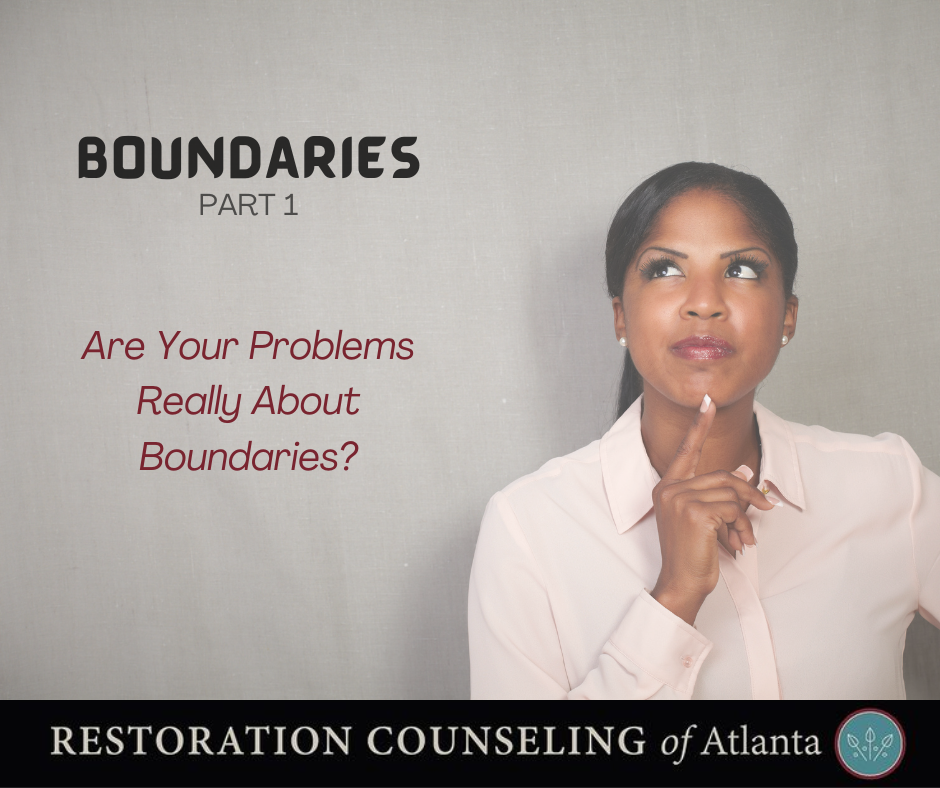Are Your Problems Really About Boundaries?
Boundaries are so important to overall emotional health. Knowing where our responsibilities lie and others’ responsibilities begin can be the key to a happier you and better, more fulfilling relationships. This can be confusing, though, because we usually only recognize boundary issues when someone has crossed our boundary, and we are left feeling resentful, angry, or hurt. Our first reaction is to put a boundary on the person who hurt us. Boundaries are not about controlling other people’s behavior, though. We can only set boundaries for ourselves.
What Are Boundaries?
It’s important to understand what boundaries are and what they are not. They are not rules we enforce on other people. Boundaries aren’t manipulation tactics to get what we want or cause others to change. They aren’t ultimatums. Boundaries are about defining self. In the book, ‘Changes that Heal,’ Dr. Henry Cloud defines boundaries as a sense of our separateness from others, the imaginary lines that mark the limits defining our personal identity. They communicate what we are and what we are not, what we will choose and what we will not, what we will endure and what we will not, what we like and what we do not. Boundaries are the psychological and spiritual definitions of who we are and are not.
These concepts are so foundational, that it’s easy to see how if we struggle with boundaries, we are at risk for a host of troubles. Healthy relationships hinge upon our own sense of self-differentiation. Without proper boundaries, we can feel overly responsible for others, under-responsible for ourselves, and prone to chaotic relationships, resentment, anxiety, depression, and in extreme cases, be vulnerable to repeated emotional and physical abuse.
Honoring boundaries starts with yourself. It means taking responsibility and ownership for what’s on your side of the street– your body, your feelings, your attitudes, your behaviors, your thoughts, your abilities, your choices, your desires, and your limits.
Symptoms of Underlying Boundary Problems
How do you know if you have trouble with boundaries? Some of these common problems can point to a deeper confusion about how and where to set boundaries.
- Depression can be reinforced by poor boundaries. If you lack a sense of agency and control over your life, you may be susceptible to mistreatment or direct anger inwardly when you can’t see that you have choices. This can cause resentment and bitterness.
- Anxiety and problems with panic, fear, and vigilance can stem from feeling out of control. Poor boundaries can lead to feeling little sense of agency in your life and result in fear and anxiety.
- Resentment results if you tend to assume a self-sacrificing posture, and then feel frustration and disappointment when others don’t live up to your expectations. You may have an underlying boundary issue.
- Passive–Aggressive Behavior– If you don’t ‘let your yes be yes and your no be no,’ you may set limits passively because of fear of setting firm boundaries.
- Codependency is a pop-psychology term describing a pattern of attitudes, beliefs, and behaviors where you take responsibility for others inappropriately. You may have sought intimacy in caring for others to compensate for not expecting to get your own needs met.
- Identity Confusion can result if you lack a sense of ownership of all your gifts, abilities, and attributes. Boundaries let us know who we are apart from others.
- Difficulty Being Alone can be a result of poor boundaries. You may fear being alone because there is no one inside. A connection to self gives the internal containment needed to sustain a life apart from others.
- Blaming can be excessive and point to a larger issue around boundaries. If you are unable to ever see any personal responsibility (even if very small) in relational difficulties, it can keep you stuck.
- Over-Responsibility and Guilt over other people’s feelings, disappointments, and behaviors can signify a belief you carry responsibility for things that are not under your control.
- Under-Responsibility for your own life can reflect the places where you’re overburdening yourself with other’s life situations. Good boundaries allow healthy self-responsibility.
- Feeling Obligated to others could reflect a tendency to give out of compulsion. Boundaries allow freedom to say ‘no’ and a feeling of self-control.
- Feeling Let Down can result from feeling over-burdened to care-take others and then disappointed that others are just ‘takers’ when they don’t reciprocate.
- Isolation can result from poor boundaries. If you feel getting close to people could mean losing yourself, cutting people off is the only way you know to maintain boundaries.
- Extreme Dependency can reflect an inability to own your own life. Boundaries are needed to learn to negotiate the world apart from others.
- Disorganization and Lack of Direction often signal that you never learned to choose your own goals and purpose. Without boundaries, you easily get side-tracked by others’ desires.
- Substance Abuse and Eating Disorders can be rooted in boundary problems. Addictive cycles reinforce feelings of being in and then out of control. Food, drugs, and alcohol dull the pain of ambivalence of wanting and not wanting the behavior or substance.
- Impulsivity can be a side-effect of poor self-boundaries. You have to learn to set internal boundaries and say ‘no’ to yourself sometimes.
- Generalized Anxiety can result from an underlying tension related to boundaries. Lack of internal structure leads to being unable to process and contain feelings as well as external demands.
What Can Get in the Way
Did some things on that list ring true? Awareness of a potential boundary issue is only the first step. It is simple to say, ‘just set a boundary,’ but there are often underlying barriers that have gotten in the way of this, or you probably would have done it. It can be very difficult to set and hold a boundary without knowing what is holding you back. There may have been family systems in place when you were growing up, which discouraged forming healthy boundaries. You may not have been allowed to feel ownership of your own body, feelings, attitudes, behaviors, thoughts, choices, and limits. It may be necessary to take a look at the ways you may not have been allowed to grow. Perhaps there was abuse, control, guilt, and manipulation in your family system. You may have to unlearn some dysfunctional relational patterns from your past in order to heal your present problems.
Distorted View of Self
These past patterns may have distorted your thinking about yourself as well. Perhaps you have grown up with some ideas that you are a bad person if you set boundaries. Or maybe you believe it is selfish to have a life of your own. It can be common in cases of chronic abuse, neglect, or complex trauma to believe everything is your fault, your wants are not important, you are responsible for others, or you must always do what others want. Other distorted thoughts stemming from poor boundaries look quite the opposite, that you must have everything you want, that your wants are the only important ones, or that nothing is your fault.
Distorted View of Others
You may have formed ideas about others that also get in the way. Maybe you believe others will hate or reject you for saying ‘no.’ You may think that others will resent you if you show assertiveness or do things that make them unhappy. Perhaps your view of others swings in the other direction, and you believe others are always trying to control or manipulate you, they are selfish or unloving if they don’t do what you want, or they are responsible for you.
Distorted View of God
Our worldview is also inextricably tied to our understanding of God. If you think of God as all love with no limits, or the opposite, as all limits and no love, you are likely to have some issues with boundaries showing up in your life. God disciplines those He loves. If you’re running into limits, you’re running into love. Understanding limits is part of how we relate to God’s sovereignty. A right view of yourself is only possible in the context of both aspects of God’s character. Jesus invites you to take His yoke and walk with Him because the burden of controlling all the outcomes is too heavy to bear by yourself.
Boundaries are simple concepts that can be life-changing, but that doesn’t always mean they are simple to implement. Getting help to recognize and rectify unhealthy boundary patterns is a great goal for counseling. I would love to help you get started making changes that can heal your life and relationships.
References
Cloud, H. (2018). Changes that heal, Four practical steps to a happier, healthier you. Zondervan.
 Carrie Beck is one of our graduate student interns. She takes a holistic, collaborative approach, tailoring theory to the individual. She works with individuals overcoming anxiety, depression, addiction, trauma, OCD, grief, chronic health issues, divorce, life transitions, and relational and parenting challenges. As an intern, Carrie is available at a reduced rate.
Carrie Beck is one of our graduate student interns. She takes a holistic, collaborative approach, tailoring theory to the individual. She works with individuals overcoming anxiety, depression, addiction, trauma, OCD, grief, chronic health issues, divorce, life transitions, and relational and parenting challenges. As an intern, Carrie is available at a reduced rate.

